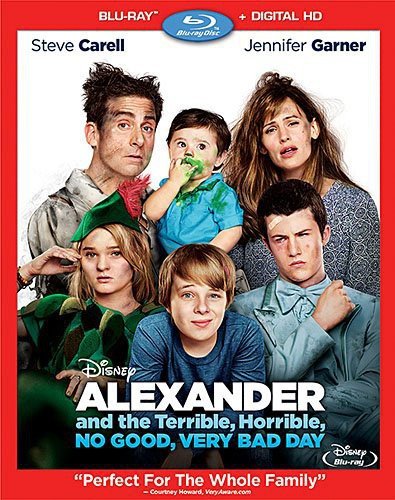
Written by S. Edward Sousa
Where have all the family films gone? Movies that cross genres and give every generation of kinfolk a little bit of the film-going experience they’re asking for. I’m talking action and adventure coupled with romance and fart jokes and out-dated references sailing clear over kids’ heads and into the deep, nostalgic recesses of parental minds dragged yet again to the theatre for something dull and overexposed. What passes for family fare these days are often dark and brooding films, like Into the Woods, or crass excursions into the juvenile, think Sponge-Bob Square Pants, movies whose adult elements are laced with cynicism, overt sexuality, or unsuspecting racialized humor, Madagascar for example. To boot, it’s even rarer to find a family film that is live action and deals with the simple chaos of American life. Yet Miguel Arteta’s Alexander & The Terrible, Horrible, No Good Very Bad Day plants itself in a firm reality, crafting a family film that embraces optimism over snarky fantasy.
Out February 10th on Blu-ray and DVD, Alexander focuses on the importance of family in the real-life, day-to-day adversities people face. Based on the beloved children’s book by Judith Viorst, written in 1972, the film stretches Viorst’s plot onto a larger canvas, telling a story about how families pull together on bad days and in hard times. And while the story changes from Viorst’s decades-old vision, the essence of learning to deal with one’s own problems emerges. Viorst, and her real-life son Alexander, turn-up in the bonus features in a sweet reflection of the story’s origins and the lasting of the book’s cultural longevity and the effect of it on their family. Much like the film, it’s a tender reminder of the importance of personal relationships and the connections people form that carry them through.
The film opens on our titular young hero Alexander Cooper, a wide-eyed and lisped Ed Oxenbould, waking to the didgeridoo sounds of his meathead older brother Anthony, played by Dylan Minnette who shines as the dimwitted elder. It’s the day before Alexander’s birthday and it’s shaping up to be one of his worst on record. There’s gum in his hair, a school-wide text of his head imposed on a bikini model, a rival birthday party threatening to draw away the few ‘friends’ who’d rsvp’d to Alexander’s own bash. His life is a series of mishaps and curses magnified by his own pessimism and his family’s never-ending series of good fortune. Anthony’s about to be crowned Prom Duke, his sister Emily is the lead in Peter Pan, his baby-brother Trevor says his first word, and his parents Ben and Kelly, played with a delightful middle-class optimism by Steve Carrel and Jennifer Gardner, are about to excel in their careers, Ben with new employment and Kelly with a promotion.
As the disastrous day closes, Alexander is alone in the kitchen in the dead of the night with a scoop of ice cream and a single candle burning, confiding in his hamster. He blows out the candle and wishes for his family to experience the horrendous hardships he surmounts almost daily. And he get what he’s asking for—Emily, too sick to perform, drags her feet through rehearsals while Anthony blows his driver’s test and gets suspended from school. Ben seemingly blows his job interview with a young hip gaming company, embodied by a too-cool-for-school Donald Glover, while Kelly’s publishing job gets turned upside down as Dick Van Dyke turns in a hilarious celebrity reading from a misprinted children’s book. Yet the day is smooth sailing for Alexander—the rival party gets cancelled and it looks likes his crush is going to make it to his own bash. His seamless day is interrupted only by his confusion as to the unraveling of everyone around him.
The film culminates in a celebration of companionship, in the comfort and empathy people share with each other. In many ways it’s a touchstone of Arteta’s work, who helms the script penned by Rob Lieber. Many of Arteta’s most recent turns behind the camera (Enlightenment, Getting On, Cedar Rapids) manage to capture Americans in the throes of middle-class emptiness, a hollow cocoon of social expectations and drastic, unfulfilling letdowns. He finds vulnerability in his characters and draws out of them an optimistic determination in order to pit them against the very cocoon-like structure that has come to define their existence. Arteta uses this to create a humor-filled sense of communion between the audience and the narrative. Shades of this emergence exist in both the father, Ben, whose self-worth teeters beneath a ‘look on the bright side’ disposition, and in Alexander who struggles to make sense of an imposing world and his ‘why me’ attitude. Arteta is just the guy to give a Disney film this touch of real-world hope—no fantasy, no miracle, just people choosing to become engaged in their own lives.